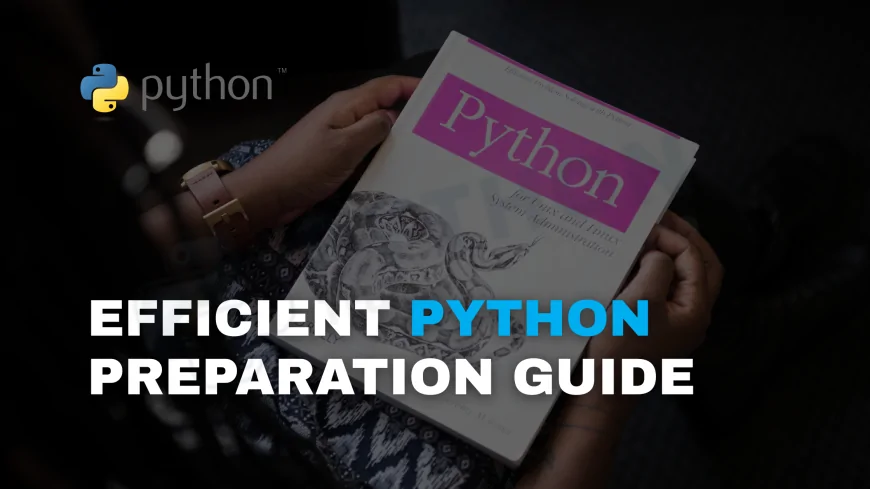How to Study Python Efficiently for Certification | Expert Tips and Training Guide
Discover how to study Python efficiently for certification with expert strategies, practical tips, and the best Python training options in Pune. Boost your IT career with top-rated courses and job-ready skills.

Python is one of the most versatile and widely adopted programming languages in the world today. Whether you're aiming to become a software developer, data analyst, automation engineer, or machine learning specialist, earning a certification in Python can be a game-changing milestone.
However, with thousands of resources available online, studying efficiently and strategically is the key to success. In this blog, we’ll explore how to study Python efficiently for certification, covering all angles — from building your study plan to handling real-world projects — without referring to specific bootcamps, institutions, or universities.
1. Why Python Certification Matters
Python certifications serve as third-party validation of your skills. They are proof that you've mastered the core concepts of Python programming. A certification gives you more than just a resume booster — it provides direction, structure, and credibility in a field where everyone claims to "know Python."
2. Know What the Certification Covers
Efficient study begins with understanding exactly what you’re being tested on. Most Python certifications focus on:
-
Python syntax and semantics
-
Control flow (if/else, loops)
-
Functions and scope
-
Data structures (lists, dictionaries, sets, tuples)
-
OOP (Object-Oriented Programming)
-
Exception handling
-
Modules and packages
-
File handling
-
Regular expressions
-
Libraries (basic usage)
Before you touch any tutorial or write a single line of code, map out the key areas your certification will focus on.
3. Building the Right Study Mindset
Learning Python for certification isn’t about speed; it’s about retention and application. The mindset required is:
-
Curiosity over shortcuts
-
Problem-solving over memorization
-
Quality over quantity
It’s easy to consume hours of content and still feel like you’re not learning. Efficient learners pause to absorb, reflect, and test their understanding.
4. Creating a Custom Study Roadmap
Don’t rely on someone else’s course outline. Create your own Python roadmap, even if you're following a book or video course.
Break it down into:
-
Week-by-week topics (e.g., Week 1: variables, data types)
-
Daily milestones (1 concept per day)
-
Checkpoint days (for revision and quizzes)
-
Project milestones (small builds every 2 weeks)
A personal roadmap keeps your learning purposeful and tailored to your timeline.
5. Leveraging Free and Low-Cost Resources
You don’t need expensive courses. There are thousands of free guides, interactive platforms, and documentation to help you:
-
Learn syntax with interactive environments
-
Practice quizzes for specific topics
-
Use open-source projects to understand applications
-
Follow blogs from independent developers
-
Watch topic-specific videos only when needed
The key is minimalism with focus — avoid jumping between 10 tutorials for the same topic.
6. Hands-On Practice is Non-Negotiable
No amount of reading or watching videos can substitute for writing actual Python code. You learn by doing, not by watching.
For every topic you learn:
-
Write a few code snippets
-
Build mini challenges (e.g., Fibonacci series, list filter)
-
Solve one related problem on a coding platform
-
Debug your own code manually
This builds muscle memory and intuition — two things critical for success in coding exams.
7. Project-Based Learning
After each module, build a tiny project to apply what you've learned. Examples:
| Topic | Mini Project Idea |
|---|---|
| Lists and Loops | To-Do List App in CLI |
| File Handling | CSV Data Summarizer |
| OOP Concepts | Inventory Management for a Bookstore |
| APIs and JSON | Weather Forecast Viewer |
| Error Handling | Input Validation Calculator |
Projects make your learning concrete and provide excellent revision.
8. Debugging and Troubleshooting
If you want to pass a Python exam, you must become comfortable with bugs and errors.
-
Learn how to read tracebacks
-
Understand common runtime and syntax errors
-
Practice debugging logic issues, not just syntax
-
Write deliberate broken code and fix it
Most learners get stuck when code fails. If you master debugging, you’ll unlock faster learning.
9. Use of Python Coding Platforms
There are many browser-based coding platforms where you can practice without setting up local environments. These platforms often have:
-
Pre-configured editors
-
Instant feedback
-
Community code samples
-
Language-specific challenges
Using such platforms allows quick iteration and reduces setup frustration, especially during the learning phase.
10. How to Study Python Concepts in Layers
Don’t aim to "master" a concept in one sitting. Learn Python in layers:
-
Exposure Layer: Watch or read about the concept.
-
Practice Layer: Write examples and test variations.
-
Challenge Layer: Solve a problem that uses the concept.
-
Project Layer: Use the concept in a real scenario.
For example, loops should be learned through:
-
Syntax → range() → nested loops → iterating lists → breaking conditions
This layered approach ensures long-term retention.
11. The Art of Note-Taking for Coding
Digital note-taking tools or handwritten notes can enhance memory retention. Key things to document:
-
Short code snippets for reference
-
Personal analogies for tricky topics (e.g., classes vs objects)
-
Flowcharts for control structures
-
Error messages and how you solved them
-
Project steps and logic design
Avoid copying code blindly. Rephrase in your own words.
12. Weekly Reviews and Code Refactoring
Every 7 days, revisit what you’ve learned. Ask:
-
Can I rewrite this function without looking at notes?
-
Can I explain this concept to a beginner?
-
Can I make my old code cleaner?
Refactoring (rewriting) your past code improves logic and syntax fluency.
13. Using Flashcards for Memorization
Flashcards are not just for theory-heavy subjects. In Python:
-
Use flashcards for built-in functions
-
Quiz yourself on methods (e.g., list.append vs list.extend)
-
Remember syntax details (e.g., dictionary syntax, lambda usage)
Use spaced repetition tools or create your own physical cards.
14. Realistic Mock Tests and Time Management
Taking mock exams under timed conditions trains your brain to:
-
Work under pressure
-
Prioritize quick wins
-
Skip questions you can come back to
After every mock test:
-
Review all incorrect answers
-
Check for patterns in your mistakes
-
Create a “trouble list” of topics to revisit
15. Practice Reading and Explaining Code
Many exam questions involve interpreting what a code block does. Efficient learners can:
-
Trace code mentally
-
Spot logic errors just by reading
-
Predict output before running
An added bonus: explain your logic out loud or in writing. This boosts understanding.
16. Managing Study Burnout and Frustration
Python is deep and vast. At times, you'll feel stuck. Manage burnout by:
-
Taking breaks with related but fun activities (e.g., watching Python memes, reading dev blogs)
-
Studying with a friend or accountability partner
-
Alternating between theory-heavy and practice-heavy days
-
Not judging your pace against others
Mental freshness increases efficiency.
17. Building a Code Portfolio Along the Way
Don’t wait till after certification to build your portfolio. Create folders by topic or project:
| Folder Name | Contents |
|---|---|
string_basics/ |
Scripts to manipulate and format strings |
oop_experiments/ |
Class-based examples and problems |
cli_projects/ |
Command-line applications |
automation_scripts/ |
File renamers, schedulers, email bots |
Your future employer (or future self) will thank you.
18. Last-Mile Prep: Focusing on the Exam
In the final week before the certification exam:
-
Stop learning new topics unless absolutely necessary
-
Review summaries and code notes
-
Re-do one project per topic
-
Take a full-length mock exam each day
-
Practice input/output problems and exception handling
Think of this week as “tuning” your brain rather than expanding knowledge.
19. Post-Certification: What Next?
Once certified, your real learning begins.
-
Start contributing to small open-source projects
-
Try solving real-world problems (e.g., scraping news, analyzing CSVs)
-
Mentor others — this solidifies your knowledge
-
Prepare for interviews with behavioral and coding questions
A certificate is not a destination; it's a gateway.
FAQ's
1. How can I start studying Python for certification as a beginner?
Start by enrolling in a structured course at a Python Training Institute in Pune. They offer beginner-friendly modules, real-world projects, and experienced mentors. This foundation helps you grasp Python basics effectively and prepares you for certification while boosting your programming confidence for career advancement.
2. What is the best way to prepare for Python certification exams?
Join a certified Python Training Institute in Pune where you get access to exam-oriented training, mock tests, and placement-focused learning. These programs align with global certification standards and increase your chances of passing the exam and landing a job in development or data roles.
3. How long does it take to prepare for Python certification?
On average, it takes 2–3 months with consistent study and practice. Institutes in Pune offer flexible batch timings and hands-on projects that accelerate learning. Their structured curriculum makes it easier to stay focused and finish preparation on time, leading to faster career opportunities.
4. What topics are essential for Python certification success?
Core topics include variables, loops, functions, data structures, OOP, file handling, modules, and exceptions. Institutes in Pune also cover real-life applications, libraries like NumPy and Pandas, and practice questions that align with certification patterns, ensuring you're well-prepared for both exams and real jobs.
5. Can a Python training course in Pune help with career growth?
Absolutely! Python training in Pune is career-oriented, combining theory with live projects and placement support. Completing certification through such institutes gives you an edge in roles like Python developer, data analyst, or automation tester, accelerating your entry into the IT industry.
6. Is classroom or online training better for Python certification?
Both are effective if offered by a reputable Python Training Institute in Pune. Online classes offer flexibility, while classroom sessions provide real-time interaction. Institutes often blend both, offering hands-on labs, assignments, and career mentorship to maximize learning and certification readiness.
7. How do Python projects help in certification preparation?
Projects help apply concepts practically and are often part of the curriculum in Pune institutes. They build problem-solving skills, which are essential for certification exams. More importantly, projects enhance your resume, giving you a career advantage post-certification.
8. Do Pune institutes offer placement support after Python certification?
Yes, leading Python Training Institutes in Pune offer 100% placement assistance. They collaborate with tech companies, conduct mock interviews, and help with resume building. This boosts your chances of securing a job immediately after earning your Python certification.
9. Is prior programming knowledge necessary for Python certification?
No prior experience is needed if you train with a certified institute in Pune. They start with the basics and gradually build up to advanced topics, making it ideal for beginners aiming to become certified Python professionals and enter the tech field confidently.
10. What are the benefits of Python certification from a Pune institute?
Python certification validates your skills and adds credibility to your resume. Institutes in Pune offer industry-aligned content, real-time projects, and expert mentoring. This combination makes you job-ready and gives you a competitive edge in the hiring process.
11. How do I stay motivated while studying Python for certification?
Join a goal-driven Python Training Institute in Pune where peer learning, interactive classes, and milestone-based progress keep you motivated. Regular feedback from mentors and visible skill growth help maintain enthusiasm throughout the certification journey.
12. Which Python certification is most valued by recruiters?
Certifications like PCEP (Certified Entry-Level Python Programmer) and PCAP (Certified Associate in Python Programming) are highly valued. Training institutes in Pune tailor their syllabus around these certifications, helping you pass with ease and increasing your job prospects in IT.
13. Are mock tests important for Python certification?
Yes, mock tests simulate the real exam environment and help identify weak areas. Python Training Institutes in Pune include regular mock tests in their curriculum to boost exam confidence, improve time management, and increase your chances of clearing the certification.
14. How can Python certification boost my IT career?
Python is in demand across fields like data science, web development, and automation. A certification from a reputed Pune institute adds professional credibility and practical skills, enabling you to land roles with higher salaries and long-term growth potential.
15. What study materials are provided in Pune Python courses?
You receive video lectures, eBooks, PDFs, coding exercises, and interview prep kits. Pune-based Python institutes focus on hands-on learning, ensuring you understand concepts deeply and are well-equipped for the certification and job market.
16. How important is daily practice in Python certification preparation?
Daily practice reinforces coding logic and syntax. Pune institutes encourage regular coding through assignments and challenges. This consistent practice is key to clearing certification exams and becoming proficient in real-world applications of Python.
17. Can working professionals also study Python for certification?
Yes, many institutes in Pune offer weekend and evening batches for working professionals. These flexible options allow you to upskill without quitting your job, and certification adds value to your resume for career transitions or promotions.
18. Do Python institutes in Pune provide real-time coding environments?
Yes, they offer cloud-based IDEs and lab access for hands-on coding. This practice environment helps learners build confidence and experience in real-time problem-solving, essential for both certification and actual software development work.
19. How do Pune institutes help with interview preparation post-certification?
They conduct mock interviews, group discussions, and aptitude tests. Career coaches guide you in resume building and portfolio creation, ensuring you’re fully prepared to face recruiters after achieving Python certification.
20. What is the cost of Python training and certification in Pune?
Costs range from ₹10,000 to ₹25,000 depending on the institute and course depth. Many Pune-based institutes offer value-packed programs including certification support, real-world projects, and placement assistance, making it a worthwhile investment in your career.
Final Thoughts
There is no one-size-fits-all method to studying Python, but efficiency comes from intentional learning, not just speed or volume. With the right study framework — layered learning, daily practice, focused review, and real-world application — you’ll not only pass your certification but also develop the confidence to use Python in real scenarios.
Whether your goal is to build apps, automate tasks, analyze data, or change your career path — Python certification is a powerful first step.
Study smart. Study with purpose. And build something great while you're at it.
What's Your Reaction?
 Like
0
Like
0
 Dislike
0
Dislike
0
 Love
0
Love
0
 Funny
0
Funny
0
 Angry
0
Angry
0
 Sad
0
Sad
0
 Wow
0
Wow
0















